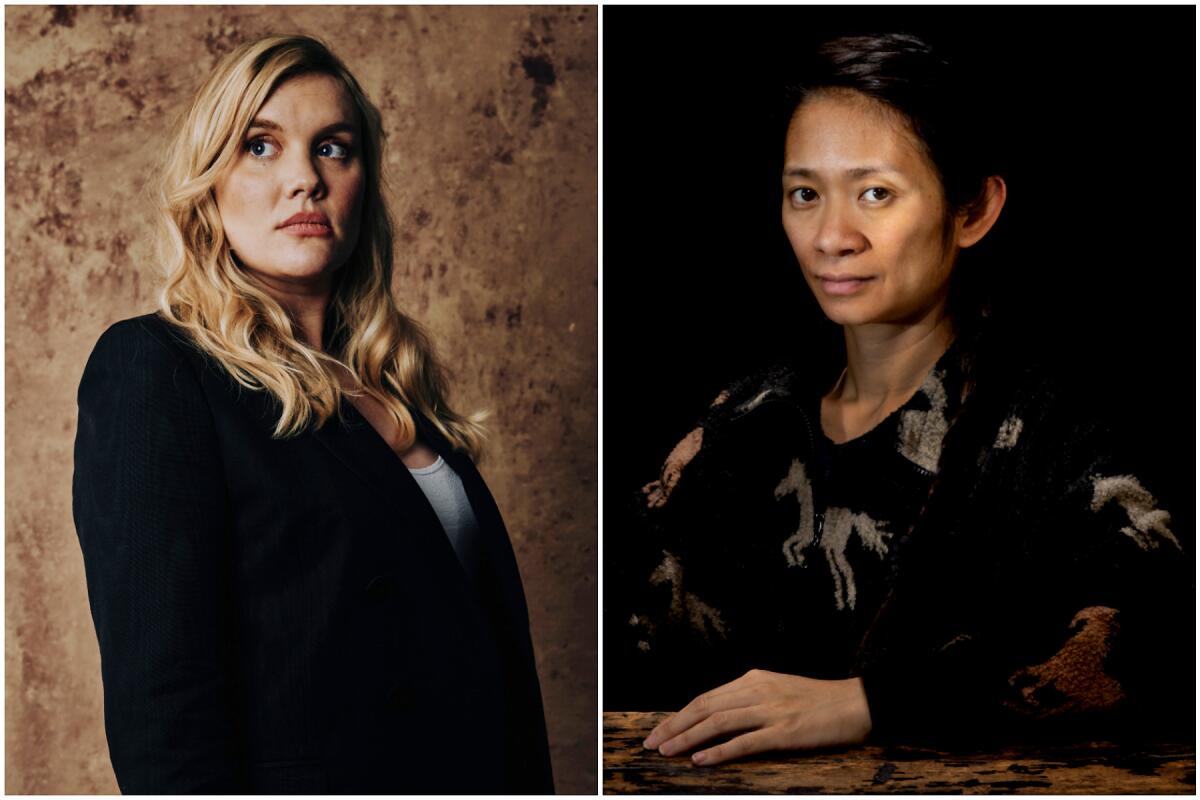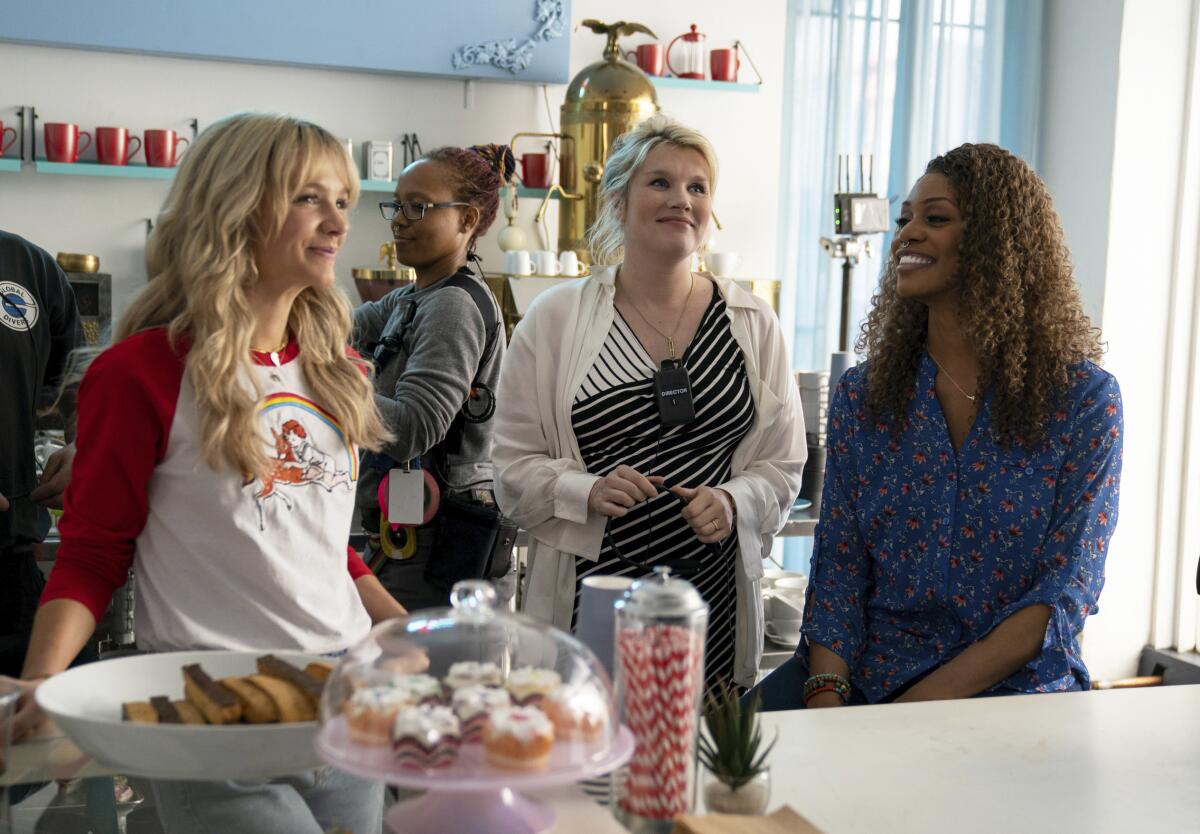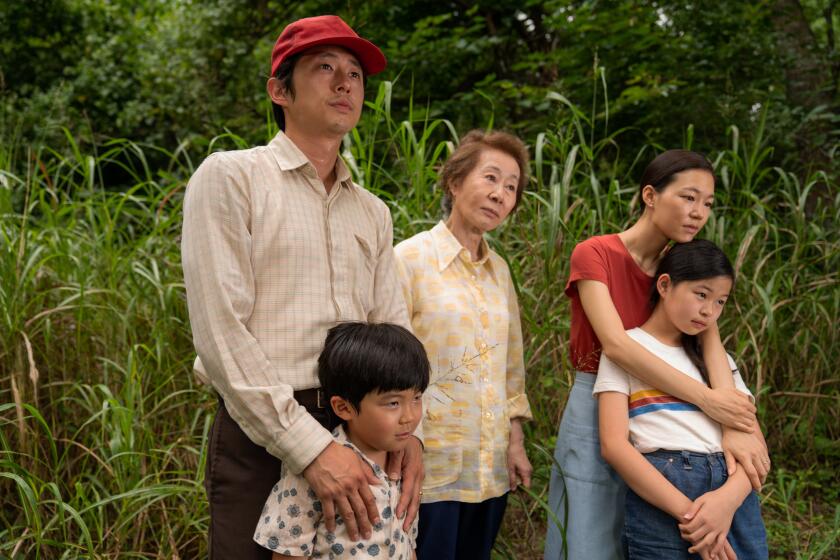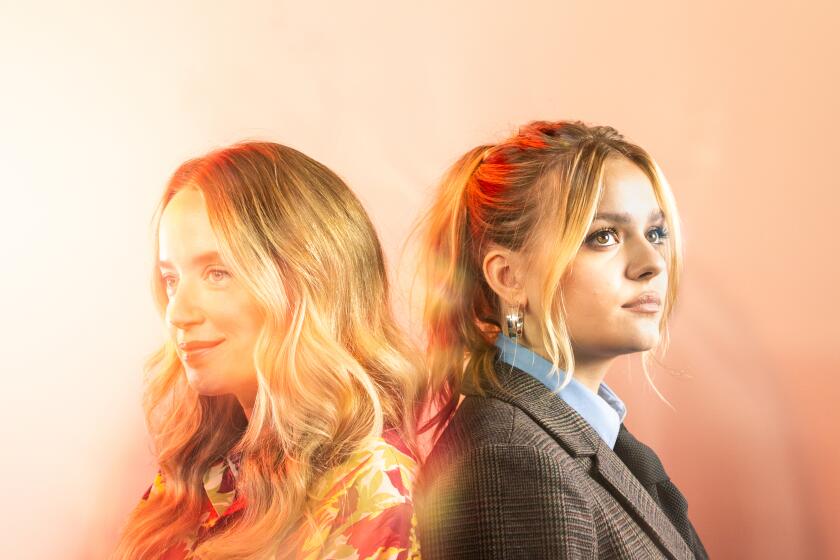Column: Why I’m not wholeheartedly celebrating Oscar’s ‘historic first’ for female directors

On Monday morning, two women were nominated for Oscars in directing, and it rained.
And perhaps someday, one of those things will not be news. (Rain in Los Angeles will always be news.)
But that “someday” is not this day. The inclusion of both Chloé Zhao and Emerald Fennell in the 2020 directing (and writing) categories represents just one set of breakthroughs on a nomination list so chock full of historic firsts — “Minari’s” Steven Yeun, first Asian American lead actor nominee, meet “Sound of Metal’s” Riz Ahmed, first Muslim lead actor nominee — that “most historic first” could be its own Oscar category.
The winner of this (entirely fictional) category would no doubt be Zhao, who with “Nomadland” became the first woman of color to be nominated for directing, as well as the first to be nominated for screenwriting, editing and best picture.
Zhao, who is Chinese, is only the sixth or seventh woman to be nominated for directing in the 92-year history of the Oscars, and I say “sixth or seventh” because, as I mentioned before, for the first time in the history of the Oscars, there are actually two — count ’em, two — female directing nominees this year; like Zhao, Fennell (“Promising Young Woman”) was also nominated in the same year for screenwriting and best picture. She is also, to the best of my knowledge, the first director nominated for a film made while in the last trimester of pregnancy.
Another historic first!
‘Nomadland’s’ Chloé Zhao is nominated alongside ‘Promising Young Woman’’s Emerald Fennell, the first time the academy has nominated more than one woman in the directing category in the same year.
Don’t get me wrong. I am very excited that Zhao and Fennell are on those lists, both for the representation and for the particular films they represent, just as I am thrilled to see Yeun and Ahmed competing in their category, for the same reasons.
It’s just that every historic “first” reminds us of the long history of “none” — and how is it possible that this the first time in 92 years that two women have been nominated for director?
“Incremental, sustainable change” is the explanation cited by Kirsten Schaffer, executive director of Women in Film, to describe the larger cause for hope and even celebration. She is directly referencing gender parity, but she could be describing the push for more general diversity that has occupied Hollywood in recent years. In 2016, after two years of #OscarsSoWhite protests, the Academy of Motion Picture Arts and Sciences began an aggressive initiative to double the number of women and people of color among its members by 2020. After reaching that goal, and increasing membership by more than 60%, the academy announced a new inclusion initiative; by 2024, films will need to meet at least two of four new criteria to be eligible for a best picture nomination.
Since then, progress has been evident in many areas — witness last year’s sweep by “Parasite,” the first film to win both international feature and best picture. But even with the new expanded movie academy and efforts by Women in Film and other groups, women have remained maddeningly underrepresented in many nonacting categories; it has been three years since Greta Gerwig was the lone female directing nominee for “Lady Bird”; 11 years since Kathryn Bigelow became the only woman to win an Oscar in directing, for “The Hurt Locker.”
“Incremental, sustainable change.” In other words, calm down and take the win; this year’s Oscar nominations are full of incremental change, especially for women — the documentary categories saw more female nominees than in years past — and we can only hope it is sustained.
“We’re very excited to have gone in a single year from five women [nominated for feature direction] in a whole century to seven,” says Schaffer. “Almost every category has a woman in it, except cinematography and score, and I think it points to our finally moving toward real inclusion.”
It certainly moves the actual nomination list a bit closer toward the all-female ballot Women in Film has circulated for the last two years — years in which there were no women nominated in directing and precious few in many other nonacting categories — to remind academy voters of all the fine work female filmmakers have done.
“We have been focusing on awareness,” Schaffer says. “There are so many films, you need to sort through the noise; now, voters know they should watch the films made by women and people of color, even if they may not have the big marketing budgets.”
For those who see the Oscars simply as a self-congratulatory event in which a big bunch of filmmakers hand out awards to a smaller bunch of filmmakers, the academy’s effort to diversify its nominees and winners may seem like a tempest in a Champagne flute. If you are fortunate enough to work in the movie business, who cares if you get an Oscar nomination?
“Minari” landed six Oscar nominations including for stars Steven Yeun and Yuh-Jung Youn, the first time Korean performers have cracked the acting races.
Well, Hollywood cares. Very deeply (honestly, if Oscars weren’t important, do you think Netflix would be pushing so hard to win them?). Beyond the simple issue of fairness — why should certain historically and systemically privileged groups get all the shiny stuff? — the Oscars remain a very powerful force in how excellence is defined. In film, and by extension, in our culture.
What stories are important enough to tell on the big screen? Whose voices are worth being heard? Whose work is interesting enough to finance, to market, to watch? Whose lives are worth exploring through cinematic art?
Everyone’s. If not literally — we’re already drowning in TV as it is — then spiritually.
“Nomadland” and “Promising Young Woman” both offer stories that have never been told in film. They both chronicle women trying to come to terms with the past, which is not unfamiliar territory, but beyond that — newly broken ground in two long and very differently shaped furrows.
In the cinematic pose poem of “Nomadland,” Fern (Frances McDormand, also nominated as both lead actress and producer) attempts to move through grief literally; stripped down to essentials by personal and economic loss, she finds a new version of herself by not actively looking. The land she travels is as scoured, troubling and beautiful as her soul.
Carey Mulligan’s Cassandra has likewise been reshaped by grief, but “Promising Young Woman” is all about intent — pointed, vengeful, tragically comedic. Just as “Nomadland” evokes, in a larger sense, the country’s economic uncertainty, “Promising Young Woman” references the experiences of #MeToo and, more recently, the protests over women’s safety currently rocking Fennell’s native Britain.

“The state of being a woman is not news to other women,” Fennell says. “#MeToo was not news to women; it is not news to women that we are frightened walking home. It’s news to people who are not used to being afraid.”
Fennell did not make “Promising Young Woman” as an answer to #MeToo or current events; she made it to tell a story as only a movie can tell a story. On Monday morning, she struggled to express the honor and shock she felt over the recognition of her first feature film — “I cannot believe I am standing in any group that includes Chloé Zhao and all the other talented women on that list,” she says. “I am quite British and disapproving of emotion, but I have been absolutely weeping all morning.”
Being a historic first or, in Fennell’s case, part of a historic first, can distract from the very art form the milestone should be expanding. Fennell is thrilled that the message of her film is adding to larger conversations, but she is particularly honored to have the academy recognize the craft of her filmmaking. “It’s still a movie,” Fennell says, “and the purpose of making a movie, rather than doing a TED talk, is that you want to connect to other people, to connect in a way particular to film.”
And that is exactly what all the initiatives around inclusion are trying to increase — those points of connection. “Representation” can sound and be treated like a politically correct must-have or an HR requirement, until you really look at and think about what it means. What exactly is being represented? Points of connection between past and present, between myth and reality, between a story and its audience — between your experience and mine, however different they may appear on the surface. We tell stories to ourselves about ourselves so that we can know ourselves and be known. That knowledge can be only as broad and deep as the stories that are told and as the people who are allowed to tell them.
There are no official historic firsts among the Oscars’ best picture finalists, but many are baked in. The contenders are as varied in narrative subject and form as they have ever been. Yes, there are still arguments to be had over what should or should not have been included, but the range of stories, in theme, form and character, cannot be dinged for lack of narrative diversity.
And narrative diversity — the quest for a deeper, broader, more wildly imaginative understanding of who we are, where we’ve been, what we could be — has been the goal all along.
More to Read
Only good movies
Get the Indie Focus newsletter, Mark Olsen's weekly guide to the world of cinema.
You may occasionally receive promotional content from the Los Angeles Times.











